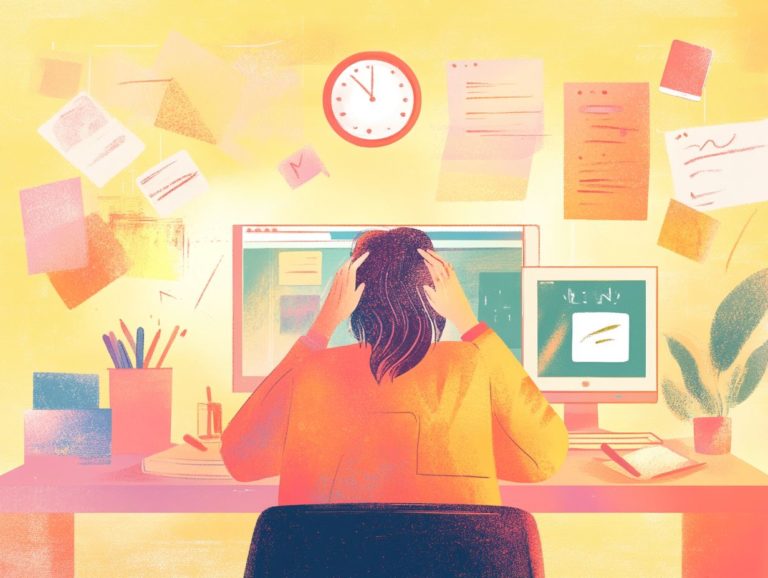What is the Importance of Reflection?
Reflection serves as a potent catalyst for personal growth and informed decision-making.
When you take the time to pause and assess your thoughts, experiences, and actions, you unlock insights that can profoundly elevate your life.
This discussion delves into the essence of reflection, highlighting its numerous benefits such as heightened self-awareness and enhanced decision-making as well as practical strategies for seamlessly integrating reflection into your daily routine.
Whether you choose journaling, meditation, or soliciting feedback, these straightforward practices can pave the way for significant transformation.
Contents
Key Takeaways:

- Reflection allows for self-examination and understanding of experiences, leading to personal growth and development.
- Through reflection, one can make better decisions by gaining a deeper understanding of their thoughts and behaviors.
- Integrating reflection into daily life through methods such as journaling and seeking feedback can increase self-awareness and lead to a more fulfilling life.
The Concept of Reflection
The concept of reflection in both educational and personal contexts is a crucial mechanism for growth.
It enables you to engage in self-reflection and develop your emotional intelligence.
By cultivating an environment that prioritizes reflective practice, you can enhance your teaching methods.
This also helps you pinpoint areas for improvement and nurture a habit of continuous learning.
This process not only fosters personal growth but is also essential in shaping meaningful careers.
Effective action arises from the depth of thoughtful contemplation.
Defining Reflection and its Purpose
Defining reflection requires you to grasp its fundamental components: self-reflection, thinking about different situations, intentional thinking, and considering different viewpoints.
Together, these elements cultivate a profound self-awareness.
Each form of thinking is crucial for analyzing your past experiences, decisions, and behaviors.
Self-reflection gives you the power to critically evaluate your thoughts and feelings, which is essential for personal growth and emotional intelligence.
Thinking about different situations hones your ability to comprehend specific contexts, allowing you to recognize patterns and adapt your strategies effectively.
Intentional thinking underscores the significance of making thoughtful decisions.
Considering different viewpoints encourages a balanced consideration of opposing perspectives.
In both your personal and professional life, engaging in reflection enhances your self-improvement.
It also boosts your performance, enabling you to make informed choices and fostering collaborative environments.
Reflection is a vital tool for success.
The Benefits of Reflection
Reflection offers incredible benefits that can truly transform your life.
These benefits include personal growth, enhanced decision-making, and a profound increase in self-awareness elements that are essential for both educators and students.
By weaving emotional intelligence into your reflective practices, you can skillfully navigate challenges.
These advantages are vital for your individual development and contribute significantly to fostering a collaborative and enriching educational environment for everyone involved.
Personal Growth and Development
Personal growth and development are intricately tied to the practice of reflection.
By engaging in self-reflection, you nurture your emotional intelligence.
As you regularly evaluate your thoughts, feelings, and actions, you uncover deeper insights into your emotional responses and motivations.
This self-awareness grants you a more nuanced understanding of your interactions with others.
It paves the way for enhanced communication and stronger relationships.
Embracing feedback becomes essential in this journey.
It opens doors to constructive criticism and valuable personal insights.
By committing to continuous learning, you enrich your professional skills and enhance your personal relationships.
This cultivates resilience and adaptability in an ever-evolving world.
Improved Decision Making

Improved decision-making stems from engaging in reflective practices. Situational thinking and emotional intelligence give you the power to analyze options and outcomes more effectively.
This reflective process allows you to critically assess your experiences, drawing on your emotional responses and context-specific insights. For instance, when faced with a team conflict, you might take a moment to reflect on past interactions. This reflection helps you better understand the differing perspectives and emotions at play. By doing so, you can choose to facilitate a dialogue, creating an atmosphere of openness rather than hastily imposing a solution.
Strategies for decision-making, such as brainstorming potential consequences or creating a list of what s good and what s bad, emerge from this kind of reflection. These practices lead to better decisions that consider both immediate and long-term effects.
Increase in Self-Awareness
An increase in self-awareness is a direct benefit of self-reflection, allowing you to better understand your emotions and behaviors an essential component of emotional intelligence.
When you take the time to thoughtfully consider your experiences and reactions, you pave the way for deeper insights into your motivations and feelings. For instance, if you reflect on a recent conflict, you might discover that your initial reaction was influenced more by past insecurities than by the actual situation at hand. This realization not only helps you identify your triggers but also enhances your ability to manage similar situations in the future.
As you cultivate this awareness, you often find yourself becoming more empathetic and better equipped to communicate effectively. This enriches your interpersonal relationships and fosters a more harmonious environment.
Methods of Reflection
You have amazing reflection methods ready for you to explore, such as journaling, meditation, and seeking feedback.
Each of these practices plays a vital role in enriching your reflective journey and fostering personal development.
Journaling
Journaling emerges as a powerful tool for self-reflection. It allows you to document your thoughts, feelings, and insights, which in turn fosters personal growth.
By regularly engaging in this practice, you can cultivate a deeper understanding of your emotions and how you respond to various life situations. This nurtures a mindset geared toward continuous learning.
Techniques such as prompt-based journaling or creating gratitude lists can further guide your journey, helping you explore your motivations and reactions in a structured way.
The act of writing down your experiences and reflections clarifies your thoughts, alleviates stress, and initiates a collaborative dialogue with yourself. This cultivates a habit of thoughtful introspection.
Meditation
Meditation can truly change your life. It cultivates mindfulness and enhances self-reflection, giving you the power to develop emotional intelligence through a deeper awareness of your thoughts and feelings.
By exploring various techniques such as focused attention (where you concentrate on a single thought or object), loving-kindness, and transcendental meditation you can immerse yourself in the present moment. This leads to a richer understanding of your mental and emotional states.
As you engage regularly in meditation, you may discover an increased ability to navigate your emotions. This can lead to improved relationships and heightened empathy. This enriched self-awareness becomes a powerful asset in recognizing and managing your personal triggers and reactions during social interactions, ultimately fostering a more emotionally intelligent version of yourself.
In conclusion, actively engaging in reflection is crucial for personal growth. Making time for self-reflection can lead to profound insights and beneficial changes in your life.
Seeking Feedback

Seeking feedback is a vital part of your reflective practice. Using feedback tools can offer you invaluable insights for both personal and professional growth.
In a world that s always in flux, recognizing your strengths is essential. This journey encourages you to explore various feedback channels like peer reviews, performance evaluations, and online platforms creating a culture of open dialogue and continuous improvement.
By engaging in self-reflection, you sharpen your skill set. You also build resilience and adaptability, traits increasingly important in today s dynamic landscape. Approaching feedback with a growth mindset makes it a powerful tool for learning, motivating you to push your limits and ultimately realize your aspirations.
Incorporating Reflection into Daily Life
Incorporating reflection into your daily life is crucial for your growth right now! It nurtures self-awareness, fosters effective decision-making, and ensures continuous growth in our ever-evolving world.
Embracing this practice allows you to adapt and thrive amidst the rapid pace of modern life.
Tips and Strategies for Regular Reflection
Implementing thoughtful tips and strategies for regular reflection helps cultivate a consistent habit. This significantly enhances both your personal and professional growth.
By setting aside specific times each week or month dedicated solely to this practice, you can create a structured approach. Techniques like journaling, mindfulness meditation, and guided reflection prompts keep the process engaging and insightful.
To maintain your motivation, consider sharing your reflections with a trusted friend or mentor. They can provide constructive feedback and encouragement. Regularly assessing outcomes will help you recognize patterns, celebrate successes, and identify areas for improvement, making the entire endeavor even more rewarding.
Over time, these practices can lead to deeper self-awareness and catalyze meaningful changes in your life.
Frequently Asked Questions
Here are some common questions about the importance of reflection:
What is the Importance of Reflection?
Reflection is an essential process in learning and personal growth. It allows us to assess our thoughts, feelings, and actions.
Why is Reflection Important in Self-Development?

Reflection helps us gain self-awareness and identify areas for improvement. This allows us to become better versions of ourselves.
How Does Reflection Help in Problem-Solving?
By reflecting on our experiences, we can identify patterns and gain a deeper understanding of the issue at hand. This leads to more effective problem-solving.
In What Ways Can Reflection Help in Career Development?
Reflection allows us to evaluate our strengths and weaknesses. It helps us identify areas for growth and make informed decisions about our career path.
Can Reflection Improve Relationships?
Yes, reflecting on our interactions and behaviors helps us understand ourselves and others better. This leads to improved communication and stronger relationships.
How Does Reflection Benefit Learning?
Reflection helps us consolidate new knowledge and make connections with prior experiences. This leads to a deeper understanding and better retention of information.






